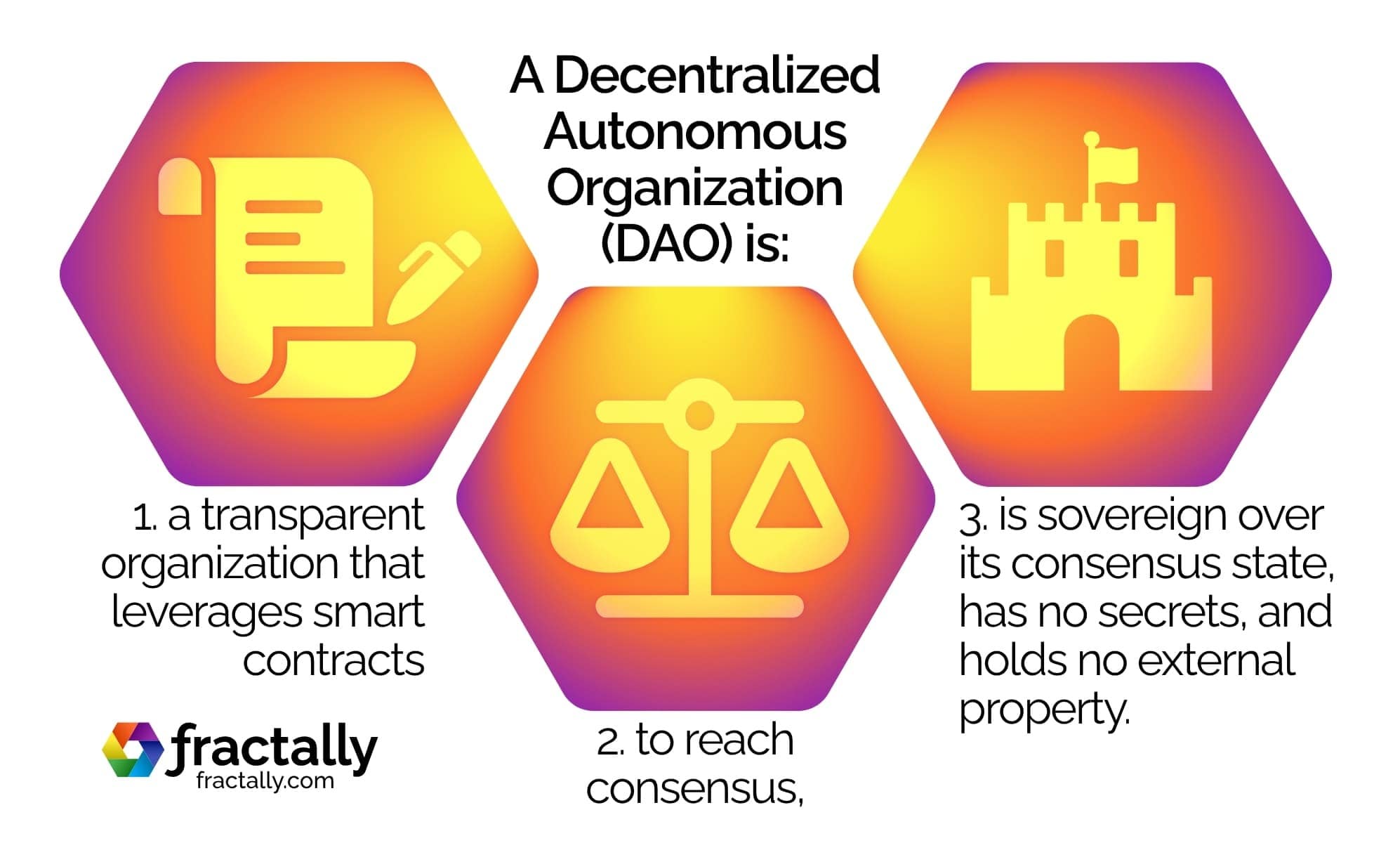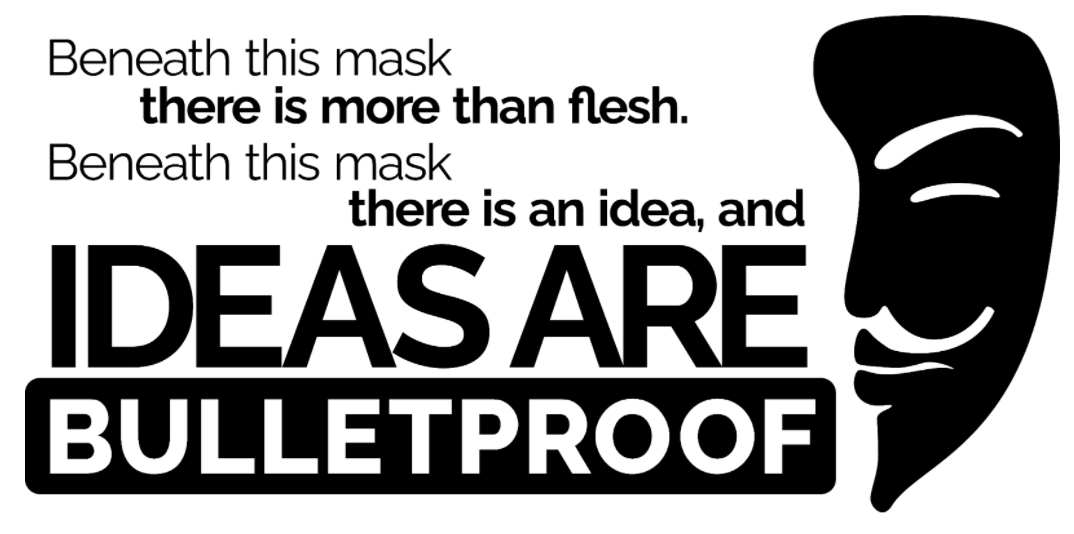
译文/Translated:
DAO的意思是去中心化自治组织(Decentralized Autonomous Organization)。“去中心化和自治”这个说法来自ƒractally创始人Daniel Larimer,2013年,他用这个词来形容比特币经济。Larimer把比特币比作去中心化公司的“股份”,这个公司发行股票获得哈希算力。
比特币:最早的DAO
如果有人想组织人类自治生产高效的电脑芯片、用来处理一个专门任务(sha256哈希),那么我们很难否定比特币的成功。在没有治理结构或中心化的协作的情况下,数百万人合作构建了最大的分布式超级计算机。这个过程中,只要人们重视货币、尊重算法,整个过程就是“自动驾驶”、“势不可挡”的。
自治的必备条件是信息主权。如果把比特币看作公司,它便不能作出承诺、没有秘密、也不能持有任何它没有完全自我主权的资产。“完全自我主权”意味着只遵守比特币共识算法。
所以DAO是信息共识,同时除非所有信息文档都被破坏,否则DAO就绝不会被摧毁。至于“治理DAO”的情况,信息被“分叉”,它被分成两份,每一份都是完整的,但是其中一份对信息的某些方面有不同理解。自由市场通过自愿交换,根据不同版本共识信息中所包含的价值,解决了争端。分叉的两个部分至少有一个可以继续,且两个都可以运作。这就是对DAO的真实测试。
因此我们可以说,DAO是纯粹的信息,其价值由市场决定。DAO只依靠言论自由和开源软件来确定性地把这些言论转化成共享的共识。

DAO不持有资产,也没有需要遵守的法律。DAO不过是认同的观点,它也因此是安全的。如果某个组织依靠秘密维系,那么这些秘密就是中心化的,而保守秘密的人也就不安全。但如果一个组织依靠的是有形资产的“共同所有权”维系,那么它也不是DAO,因为这个资产可以被拿走或破坏。如果一个组织依靠任何它自己没有主权的信息维系,它也不是DAO。
以太坊的The DAO
比方说,以太坊智能合约The DAO就筹集了创纪录的一大笔以太坊代币,这些代币被另一个代币以“集体投资项目”管理。尽管它叫做The DAO,但我们还是认为它不过是以太坊下运营的一个智能合约而已。以太坊是一个DAO,但是,The DAO之不过是透明的、用智能合约运营的、集体投资项目而已。这个智能合约被利用的时候,它就迫使整个以太坊区块链分叉解决问题。这个分叉就是以太坊经典(Ethereum Classic)。
智能合约需要去中心化、自治、独立。如果The DAO和以太坊(ETH资产平衡表)没有共同状态,那么以太坊就没办法分叉改变The DAO,如果遇到任何争议,The DAO只能自己分叉。
让DAO“自治”的是信息的透明度和独立性,但什么让它实现去中心化呢?当不管任何一群人做出什么的时候,DAO都能继续运转的时候,DAO就实现了去中心化。只要有人认同比特币的共识状态,某人、在某地、愿意完成让区块链运行下去的工作证明。但如果,人们只是因为中本聪或某个中心化的团队在给共识信息带来好处而认同比特币,那它也就中心化了。
第一个社交媒体DAO Steem的创始公司Steemit被出售后,新团队想把网络引到另一个方向的时候,老团队就想做一个社区,对Hive进行分叉。透明的信息、每个人都可以加入,对信息提供服务,这就是它实现去中心化和自治的方法。不管未来如何,组织还是会继续发展。
以下就是DAO的特点
- 没有秘密(比如共同拥有的私钥)
- 没有法律地位
- 没有有形或无形的外部资产
- 没有知识产权
- 没有对基础架构的垄断权
- 只有对可分叉信息的共识
如果DAO可以创造一台由先进的定制硅芯片运行的最大的超级电脑,那它还能做什么呢?它能否创造一个新的法律系统?能否促进创新、创造、开源软件发展?能否发现疾病的治疗方法?能否停止腐败?要是合理的治理模式下的DAO能够完成以上这些和更多的事情,那会怎么样呢?我们相信,fractally正在创造的系统能改变人们如何看待协作带来的价值。
原文/Original:
DAO stands for Decentralized Autonomous Organization. The description “decentralized and autonomous” was originally coined by ƒractally’s founder, Daniel Larimer, in 2013, to describe the economics of Bitcoin. Larimer described Bitcoins as “shares” in a decentralized company which issued shares in exchange for hashpower.
Bitcoin: The first DAO
If someone wanted to organize humans to autonomously produce highly efficient computer chips for performing a specific task (sha256 hashing), then it is hard to deny the success of Bitcoin. Without any governing structures or centralized coordination millions of people cooperated to build the largest distributed supercomputer in the world. This process is on “autopilot” and “unstoppable” as long as people valued the currency and respected the algorithm.
The critical ingredient to being autonomous is being sovereign over information. Bitcoin, when viewed as a company, can make no promises, hold no secrets, and hold no assets that it is not fully self-sovereign over. By “fully self-sovereign” it means they are solely subject to the Bitcoin consensus algorithm.
A DAO is therefore consensus over information and can never be destroyed unless all copies of the information are destroyed. In the digital age, destroying all copies of anything is next to impossible.
When it comes to “governing a DAO”, the information is “forked” and two copies of the information are created, each of which being fully complete, one of which has a different opinion on some part of the information. The free market, via voluntary exchange, resolves the dispute according to the value placed on each version of the consensus information. One or both sides of the fork can continue and are fully functional. This is the true test of a DAO.
We can therefore say that a DAO is pure information, the value of which is judged by the market. A DAO only depends on the freedom of speech and the open source software to deterministically interpret that speech into a shared consensus.

A DAO has no assets that can be seized, no laws it is subject to. A DAO is nothing more than a shared idea and is therefore bulletproof. If an organization depends upon secrets, then those secrets are centralized and the keeper of those secrets is not bulletproof. If an organization depends upon “shared ownership” of tangible property, then it is not a DAO, because the property could be taken or destroyed. If an organization depends upon any information it is not sovereign over, then it is not a DAO.
Ethereum’s “The DAO”
For example, “The DAO”, an Ethereum smart contract, raised a record amount of Ethereum tokens to be managed in a “collective investment scheme” governed by another token. Despite the name (“The DAO”), we contend that it was merely a smart contract operating under Ethereum. Ethereum being a DAO while, “The DAO”, was merely a transparent, smart contract operated, collective investment scheme. When the smart contract was exploited it forced the entire Ethereum blockchain to fork in order to resolve the dispute. This fork became known as Ethereum Classic.
A smart contract is only as decentralized and autonomous as it is independent. If “The DAO” had no shared state with Ethereum (the ETH balances), then there would be no way for an Ethereum fork to change “The DAO” and “The DAO” would have had to fork itself if there was any dispute.
The transparency and independence of information is what makes a DAO “autonomous”, but what makes it decentralized? A DAO is decentralized when it continues to function regardless of what any subgroup of people do. As long as some people value the consensus state of Bitcoin, someone, somewhere, will do the proof of work necessary to keep the blockchain moving forward. If, on the other hand, people only value Bitcoin because of what Satoshi or a centralized team is doing to bring value to the consensus information then it becomes centralized.
Steem, the first social media DAO, had incentives that inspired the community to fork Hive when the founding company, Steemit, was sold and the new owner attempted to take the network in a different direction. The information being transparent, combined with the ability for anyone to step up and provide services around the information is what made it decentralized and autonomous. No matter what comes, the organization will keep going.
This is what defines a DAO:
- No Secrets (e.g. communally owned private keys)
- No Legal Standing
- No Tangible or Intangible external Assets
- No Intellectual Property
- No Monopolies on Infrastructure
- Just consensus over forkable Information
If a DAO can inspire the creation of the world’s largest supercomputer powered by extremely advanced custom silicon chips, what else can a DAO do? Can it create a new legal system? Can it motivate a surge in innovation, creativity, and open source software development? Can it find cures to diseases? Can it end corruption? What if a DAO powered by the right governance process could do all these things and more? ƒractally is creating a system that we believe has the potential to revolutionize how people realize the value created with the power of collaboration.
原文链接/Original URL: